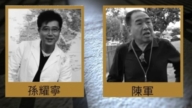【新唐人2014年05月03日訊】在毒食品、毒奶品、地溝油充斥中國的同時,一部介紹中國民間傳統飲食文化的系列片,《舌尖上的中國》則受到罕見的熱烈好評,收視率甚至接近一些熱門綜藝節目和偶像劇。但在目前《央視》推出的《舌尖上的中國》第二季,食品卻成了配角。這也引發了人們的廣泛議論。請看報導。
在中國,除了享受「特供」的特殊群體之外,大多數人都陷入了食品安全的危機,包括:無所不在的土壤、水和空氣污染、農產品農藥嚴重超標、無處不在的毒食品,還有那些憂心忡忡的中國父母,在全球範圍內搜購奶粉等。
另一方面,與危機重重的現實正好相反,《舌尖上的中國》這部介紹中國民間傳統飲食文化的系列片,則用唯美的畫面和溫暖情調超越現實,詳盡無遺的展示了各種獨具中國特色的美食,從酥油蜂蜜、清燉跳跳魚到雷山魚醬,再到泉州蘿蔔飯,這些美食背後的故事給人們留下了深刻的印象,受到觀眾的追捧。
人們也以能在電視上看到家鄉的美味食物而自豪。
廣州《南方都市報》對此指出,中國城市化的速度在人類歷史上前所未見,地方文化的多樣性也以驚人的速度消失。那些多樣、為吃飽、吃好而充分開掘的生存智慧不可再得,如同逝去的活化石。人們對鄉村生活的懷舊、對精美食物根深蒂固的嚮往,和食品安全危機引發的憧憬,都投射在了這部記錄片上。
中國詩人和文化評論家葉匡政表示,《舌尖上的中國》第一季,由於比較真實的反映了中國發達的飲食文化,受到人們的歡迎。但在中國,優秀的記錄片是不多見的。
中國詩人和文化評論家葉匡政:「其實中國記錄片,它是處在一種非常衰落的趨勢,因為中國的很多記錄片都被認為是為意識形態說話的,尤其是在電視臺裡面,能播的這些記錄片。」
最近,《舌尖上的中國II》在《央視》開播,與第一季贏得滿堂彩的情況完全不同。
美國《華爾街日報》就以「《舌尖上的中國II》有點變味兒」為題,刊發評述文章說,這部記錄片製片人似乎更在意扣動觀眾的心弦,食物的製作者和食用者成了主角,而不是食物本身,喧賓奪主。
文章還引述很多中國觀眾的話指出,《舌尖上的中國II》似乎已變成一檔愛國主義教育節目,而不再是一部純粹的美食記錄片,試圖把個人情感上升到政治層面。
據記錄片官方網站介紹,《舌尖上的中國II》將涵蓋教育、富士康以及單親家庭等主題。
美國《華爾街日報》也對此表示,這些與食物有何關係還不得而知。
其實,在第二季首映禮上,《央視》臺長胡佔凡在講話中,就把《舌尖上的中國》的「吃文化」與中共主席習近平的「中國夢」聯繫到了一起。
中國獨立中文筆會會員朱欣欣表示,任何事情在中國都可能被「泛政治化」,因為中共的政權需要裝修、需要化妝,需要找到合法的統治藉口。
朱欣欣指出,中國人要想找尋中國傳統文化,台灣、南韓等東亞周邊的一些國家,比大陸更是理想之地。
中國獨立中文筆會會員朱欣欣:「因為這個政權合法性缺乏基礎,缺乏合法性的來源,它就需要在社會的經濟、文化等等其他方面來要尋找所謂的合法性的藉口。通過把所有的社會的所謂它認為的成就、一些好的地方,都歸功於它這個制度、它這個政權。」
大陸網路作家荊楚認為,「吃」是人動物化的本能,一個民族過高的強調和拔高這些本能的行為,那麼就顯得那個民族在道德方面、在思想文化層面低能了。
大陸網路作家荊楚:「一個人在滿足了基本的生活需求之後,應該向更高層次方向發展,這個國家、這個民族才有前途。就是要追求社會的真義、追求社會的公平,要追求老百姓的尊嚴,這些基本的價值觀。得向這方面發展。」
荊楚表示,現代文明社會,都是在關注生活的品質,但在中國食品安全都不能保證。差距也太遠了。
採訪/易如 編輯/宋風 後製/孫寧
A Bite of China Turns Sour
When Chinese markets are filled with toxic food, tainted milk,
and gutter oil, the CCTV documentary, ‘A Bite of China’
gained popularity and high ratings.
In its second season, food took a supporting role and the
audience was quite dissatisfied. Please see the report.
In China, the elite groups enjoy the special produce, but the
majority of Chinese people are at risk from food safety issues.
These include soil, water and air pollution, and high levels of
pesticides, chemical residues, toxic foods and tainted milk.
The worried Chinese parents are shopping overseas
for safe infant formula.
In contradiction to the crisis-ridden reality of food in China,
the documentary ‘A Bite of China’ introduced traditional
Chinese cuisines in elegant and warm images outside reality.
The audiences were impressed and
the films were highly praised.
Many are proud of their home town delicacies.
Southern Metropolis Daily commented that as urbanization
continues cultural diversity is disappearing at an alarming rate.
The wisdom and diversity in fine food are missing.
Peoples’nostalgia for rural life and fine cuisines initiated by
daily food safety issues were reflected in the documentary.
Poet and cultural critic Ye Kuangzheng indicates that the first
season of ‘A Bite of China’ was welcomed because it showed
the true Chinese food culture.
After all, good documentary is rare in China today.
Ye Kuangzheng, poet and cultural critic: “In fact,
documentaries are declining in China, because they
only serve to speak on behalf of the ideology."
The second season of ‘A Bite of China’ recently aired on
CCTV, however, was not so welcome.
The Wall Street Journal Chinese edition stated that ‘A Bite of
China II’ was a little off-taste.
The food makers and the consumers became the main theme,
and distracted from the topics of the film.
Many Chinese viewers considered ‘A Bite of China II’ a
patriotic education program, shifting from personal indulgence
in purely tasty food to political propaganda, said WSJ Chinese.
According to the official website of the documentary,
‘A Bite of China II’ covers education, Foxconn, and
single-parent families.
WSJ questioned the relation of the topics to food.
In the premiere of ‘A Bite of China II’, CCTV Director
Hu Zhantai actually addressed the connection between the
documentary and Xi Jinping’s ‘China Dream.’
Independent Chinese PEN Center member Zhu Xinxin said
that anything in China is likely to be “politicized" to whitewash
the Chinese Communist Party (CCP) legality in ruling.
Zhu Xinxin indicates that traditional Chinese culture is better
served in other East Asian countries such as Taiwan and Korea
than in the mainland.
Zhu Xinxin: “The CCP lacks legality or sources of legitimacy.
They are seeking excuses to legitimize themselves through the
economy and culture.
Therefore, they try to connect achievements from society
to the CCP system and the regime."
Internt writer Jing Chu believes that “eating" is an instinctive
behavior of people turning into animals.
When this instinctive behavior was excessively emphasized
and overstated, it showed that the moral and ideological
culture of the nation is declining.
Jing Chu, Internet writer: “When the basic needs of life are
met, pursuit of higher level development will lead to a better
future for the country and the nation.
That is to pursue the true meaning, the justice, the dignity of
the society and the people.
These are the fundamental values
that ought to be further developed."
Jing Chu says that while modern civilized societies are
about quality of life, the basic food safety is still highly
questioned in China. The gap is just too wide.
Interview/Yi Ru Edit/Song Feng Post-Production/Sun Ning





























